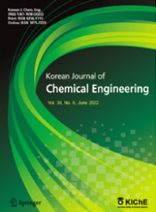Articles & Issues
- Language
- English
- Conflict of Interest
- In relation to this article, we declare that there is no conflict of interest.
- Publication history
-
Received March 5, 2001
Accepted April 4, 2001
-
 This is an Open-Access article distributed under the terms of the Creative Commons Attribution Non-Commercial License (http://creativecommons.org/licenses/bync/3.0) which permits
unrestricted non-commercial use, distribution, and reproduction in any medium, provided the original work is properly cited.
This is an Open-Access article distributed under the terms of the Creative Commons Attribution Non-Commercial License (http://creativecommons.org/licenses/bync/3.0) which permits
unrestricted non-commercial use, distribution, and reproduction in any medium, provided the original work is properly cited.
Copyright © KIChE. All rights reserved.
All issues
Degradation of High Density Polyethylene, Polypropylene and Their Mixtures in Supercritical Acetone
Department of Chemical Engineering, Hanyang University, Kyunggi-do, Ansan-si 425-791, Korea 1Department of Chemical and Biochemical Engineering, Toyama University, 3190 Gofuku, Toyama 930-8555, Japan
gchwang@kemco.or.kr
Korean Journal of Chemical Engineering, May 2001, 18(3), 396-401(6)
https://doi.org/10.1007/BF02699185
https://doi.org/10.1007/BF02699185
 Download PDF
Download PDF
Abstract
The degradation of high density polyethylene (HDPE), polypropylene (PP) and their mixtures was carried out in supercritical acetone under the reaction temperature ranging from 450 ℃ to 470 ℃, pressure ranging from 60 atm to 100 atm and reaction duration time as 60 min. The yields of gas, oil and wax components and the compositions and distributions of liquid-like products were measured by means of gas chromatography and gas chromatography/mass spectrometer. In every run, the reaction was completed in 30 min after reaching the prescribed temperature. The yields of oil and gas degraded from PP were not greatly influenced by the temperature, whereas in HDPE, the yields of oil decreased and that of gas increased, respectively, with rising temperature. The yields of oil from HDPE and PP increased with increasing pressure up to 7 atm and the values under higher pressure remained almost constant, i.e., 88% for HDPE and 96% for PP. Correspondingly, the yields of wax from HDPE and PP decreased with increasing pressure below 75 atm and above the value they remained almost constant, especially zero with PP. Generally, the degradation performance was influenced by the temperature rather than applied pressure. For the degradation of mixtures of HDPE and PP, with increasing PP composition, the yield of oil increased, whereas that of wax decreased, and above 80% of PP composition, it decreased to zero. For example, the yields of oil, wax and gas from a 52 wt% HDPE~48 wt% PP mixture, amounted to 90 wt%, 1 wt% and 9 wt%, respectively. The yield of wax decreased with_x000D_
increasing PP percentage.
References
Choi JW, "Development for the Waste Plastics Pyrolysis Process," Ministry of Commerce Industry and Energy (Korea), R&D report, 38 (1997)
Dhawan JC, Bencsath AF, Legengre RC, "Depolymerization Reactions of Cis-polyisoprene and Scrap Rubber in Supercritical Toluene," Americal Chemical Society, 380 (1993)
Hwang EY, Choi JK, Kim KH, Park DW, Woo HC, Korean J. Chem. Eng., 15(4), 434 (1998)
Hwang GC, Kim BK, Bae SY, Yi SC, Kumazawa H, J. Ind. Eng. Chem., 5(2), 150 (1999)
Joung SN, Park SW, Kim SY, Yoo KP, Bae SY, Korean J. Chem. Eng., 16(5), 602 (1999)
Jung DS, Kim SC, Yu EY, "A Study on the Characterization of Oil Recovery from Polyethylene Mixture through Thermal Degradation," J. of the Research Institute for Catalysis (Chunnam National University, Korea), 20, 55 (1998)
Kim BK, Hwang GC, Bae SY, Yi SC, Kumazawa H, J. Appl. Polym. Sci., in printed (2001)
Kocher BS, Azzam FO, Lee S, "Reaction in Supercritical Fluids," Prepared for Presentation at the AIChE Annual Meeting, November, 7 (1993)
Koll P, Metzger T, Angew. Chem.-Int. Edit., 17, 754 (1978)
McCaffrey WC, Kamal MR, Cooper DG, Polym. Degrad. Stabil., 47, 133 (1995)
Modell M, "Processing Methods for the Oxidation of Organics in Supercritical Water," U.S. Patent 4543190 (1985)
Oh SC, Lee HP, Kim HT, Yoo KO, Korean J. Chem. Eng., 16(4), 543 (1999)
Dhawan JC, Bencsath AF, Legengre RC, "Depolymerization Reactions of Cis-polyisoprene and Scrap Rubber in Supercritical Toluene," Americal Chemical Society, 380 (1993)
Hwang EY, Choi JK, Kim KH, Park DW, Woo HC, Korean J. Chem. Eng., 15(4), 434 (1998)
Hwang GC, Kim BK, Bae SY, Yi SC, Kumazawa H, J. Ind. Eng. Chem., 5(2), 150 (1999)
Joung SN, Park SW, Kim SY, Yoo KP, Bae SY, Korean J. Chem. Eng., 16(5), 602 (1999)
Jung DS, Kim SC, Yu EY, "A Study on the Characterization of Oil Recovery from Polyethylene Mixture through Thermal Degradation," J. of the Research Institute for Catalysis (Chunnam National University, Korea), 20, 55 (1998)
Kim BK, Hwang GC, Bae SY, Yi SC, Kumazawa H, J. Appl. Polym. Sci., in printed (2001)
Kocher BS, Azzam FO, Lee S, "Reaction in Supercritical Fluids," Prepared for Presentation at the AIChE Annual Meeting, November, 7 (1993)
Koll P, Metzger T, Angew. Chem.-Int. Edit., 17, 754 (1978)
McCaffrey WC, Kamal MR, Cooper DG, Polym. Degrad. Stabil., 47, 133 (1995)
Modell M, "Processing Methods for the Oxidation of Organics in Supercritical Water," U.S. Patent 4543190 (1985)
Oh SC, Lee HP, Kim HT, Yoo KO, Korean J. Chem. Eng., 16(4), 543 (1999)

